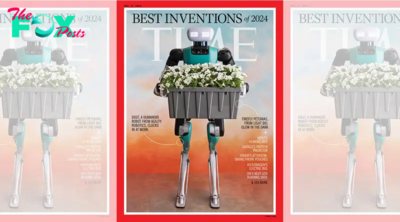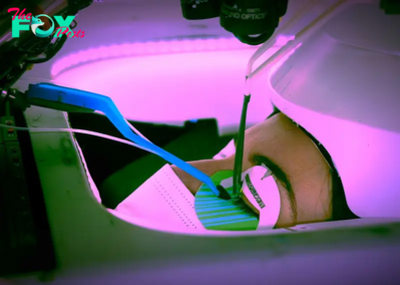Technology
The Scarlett Johansson Dispute Erodes Public Trust In OpenAI
Scarlett Johannson has gone to war with OpenAI, and in the battle for public opinion, OpenAI is losing—badly.
Last week, OpenAI released an update of its AI chatbot called ChatGPT-4o, which featured a female voice talking to its users. Many people pointed out that the voice, which sometimes seemed to veer into flirtation, was eerily similar to Scarlett Johannson’s in the 2013 dystopian sci-fi film Her. (Johannson voices a chatbot who falls in love with the protagonist in the film.) OpenAI CEO Sam Altman has long talked about how much the movie inspired the company’s products, and even made the connection clear last week by tweeting the title of the movie.
But on Monday, Johannson released a statement saying OpenAI had asked her to be the voice of the chatbot, and when she refused, they found a soundalike. Johannson said that she was “shocked, angered and in disbelief” by the turn of events. The company contended that the voice was not inspired by her, and recorded by a different actor—but proceeded to pull the voice of the chatbot anyway.
Read More: Scarlett Johansson ‘Angered’ By ChatGPT Voice That Sounded ‘Eerily’ Like Her
The backlash on social media against Altman was intense, with users accusing him of acting unethically.
This is far from the first significant battle that has been waged against OpenAI, though Johannson’s may be the most high-profile. The company has a track record of cutting corners when it comes to permissions or copyright, then dealing with consequences later. While this technique has helped OpenAI grow rapidly, it also has engendered intense criticism.
Lawsuits Centering Upon Copyright
The issue of whether artificial intelligence companies should be able to train their models on copyright material has been one of the most contentious battlegrounds during the industry’s growth. OpenAI hasn’t even denied that it uses the method to train its models: It told the UK’s House of Lords that “it would be impossible to train today's leading AI models without using copyrighted materials.”
But many creators have fought back in court in an attempt to protect their work and likenesses. Sarah Silverman accused the company of stealing her work by training its model with her memoir The Bedwetter. George R.R. Martin and John Grisham joined a similar lawsuit, accusing the company of "systematic theft on a mass scale." And the New York Times filed its own suit.
Johannson’s case is slightly different, because the company did not train its model on her voice: They simply hired an actress that sounded like her. These sorts of disputes have existed long before AI: the singer Tom Waits, for example, was awarded $2.5 million in damages after filing a lawsuit against Frito-Lay in 1988, alleging that the company had hired a singer to imitate him and his distinct gravelly voice in a Doritos commercial. But OpenAI’s use of a Johannson soundalike does fit into a larger pattern of the company scraping from pop culture tentpoles in order to strengthen its products.
Personal Accusations Against Sam Altman
OpenAI critics have also argued that the Johannson dispute fits into a larger History of Altman acting dishonestly in order to get what he wants. Last year, sources told TIME that Altman had a History of being misleading and deceptive. OpenAI’s CTO Mira Murati accused him of manipulating executives to get what he wanted in October, and co-founder and chief scientist Ilya Sutskever compiled a list of 20 times he believed that Altman misled OpenAI executives over the years. Their concerns led to the company’s board briefly ousting Altman from the company, but he quickly returned after receiving an outcry of support from both inside and outside OpenAI.
Since then, reports have trickled out of employees questioning Altman’s leadership style and accusing him of acting in psychologically abusive ways. And just last week, Sutskever and executive Jan Leike stepped down from the company, with Leike tweeting that “over the past years, safety culture and processes have taken a backseat to shiny products.”
Spurring Regulation?
While much of OpenAI’s drama has been confined to Silicon Valley circles, the outcry following Johannson’s statement shows that the public apPetite for regulation of AI companies is high. A Pew study from last year found that 67% of those who are familiar with chatbots like ChatGPT voiced concern that the government will not go far enough in regulating their use. In March, Tennessee became the first state to pass legislation combating unauthorized artificial intelligence impersonation.
In her statement, Johannson called for “the passage of appropriate legislation to help ensure that individual rights are protected.” The Hollywood guild SAG-AFTRA is pushing the No AI Fraud Act, a bipartisan bill introduced in January, which would restrict digital likenesses without consent. Hawaiian Senator Brian Schatz responded to the incident on Twitter:
More From TIME
-

 Technology11h ago
Technology11h agoBreaking up Google? What a Chrome sell-off could mean for the digital world | The Express Tribune
-

 Technology1d ago
Technology1d agoAI harm is often behind the scenes and builds over time – a legal scholar explains how the law can adapt to respond
-

 Technology1d ago
Technology1d agoNewborn planet found orbiting young star, defying planet formation timeline | The Express Tribune
-

 Technology1d ago
Technology1d agoAwkwardness can hit in any social situation – here are a philosopher’s 5 strategies to navigate it with grace
-

 Technology1d ago
Technology1d agoNo need to overload your cranberry sauce with sugar this holiday season − a food scientist explains how to cook with fewer added sweeteners
-

 Technology1d ago
Technology1d agoTeslas are deadliest road vehicles despite safety features: study | The Express Tribune
-

 Technology2d ago
Technology2d agoUS pushes to break up Google, calls for Chrome sell-off in major antitrust move | The Express Tribune
-

 Technology2d ago
Technology2d agoPublic health surveillance, from social media to sewage, spots disease outbreaks early to stop them fast



























